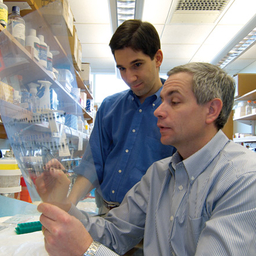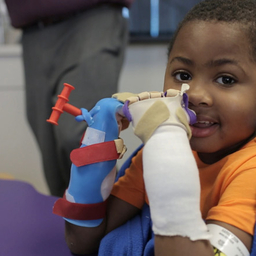Search the Newsroom
Filter By
Showing 2701 - 2710 of 2900 results
Fetoscopic Endoluminal Tracheal Occlusion (FETO) in Severe Left CDH
Despite advances in care, there remain high rates of morbidity and mortality in cases of severe CDH. Read about CHOP’s FDA-approved study of fetoscopic endoluminal tracheal occlusion (FETO).
Beyond Therapy: Long-term Follow-up Facilitates Early Recognition and Support for CDH Complications
Neonates with congenital diaphragmatic hernia (CDH) often require intensive treatment after birth and have prolonged hospitalizations, and may suffer a variety of complications after discharge. Comprehensive interdisciplinary follow-up care is critical for long-term well being.
Research Update: 8- to 13-Year Study of Neurodevelopmental Outcomes in Children with Pulmonary Hypoplasia
The Pulmonary Hypoplasia Program at The Children’s Hospital of Philadelphia is committed to tracking outcomes of children with pulmonary hypoplasia in an effort to improve understanding and care. A recent review of neurodevelopmental outcomes at 5 years of age found that CDH survivors are at increased risk for developing emotionally reactive and pervasive developmental problems.

CHOP Is a Founding Member of New NIH-Funded Research Consortium to Test New Cancer Treatments for Children
Building on its decades-long investigations in the biology and treatment of neuroblastoma, CHOP will lead the consortium’s neuroblastoma research program.
Children’s Hospitals Are Shifting Away from CT Use to Other Imaging Tools
Hospitalized children are less likely to receive CT scans for common diagnoses, and more likely to receive MRIs and ultrasound--which don’t use ionizing radiation.

World’s First Child to Receive a Bilateral Hand Transplant Returns Home from The Children’s Hospital of Philadelphia
Zion Harvey, the world’s first child to receive a bilateral hand transplant earlier this summer, was discharged from The Children's Hospital of Philadelphia (CHOP) earlier today.
Genetic Overlapping in Multiple Autoimmune Diseases May Suggest Common Therapies
Scientists who analyzed the genes involved in 10 autoimmune diseases that begin in childhood have discovered 22 genome-wide signals shared by two or more diseases
Technically Speaking: Screening Patients for Contraindications and Precautions to Vaccination
Before giving any doses of vaccines, clinicians should make sure patients and parents are carefully questioned about contraindications or precautions to vaccination. Find out about resources available to help clinicians ensure these details are not overlooked

World’s first bilateral hand transplant on a child performed at the Children’s Hospital of Philadelphia
Surgeons at The Children’s Hospital of Philadelphia joined with colleagues from Penn Medicine recently to complete the world’s first bilateral hand transplant on a child.
Novel Treatments Emerging for Human Mitochondrial Diseases
Using lithium and other drugs in cell and animal models, CHOP researchers may have broken a logjam in devising effective treatments for mitochondrial diseases.